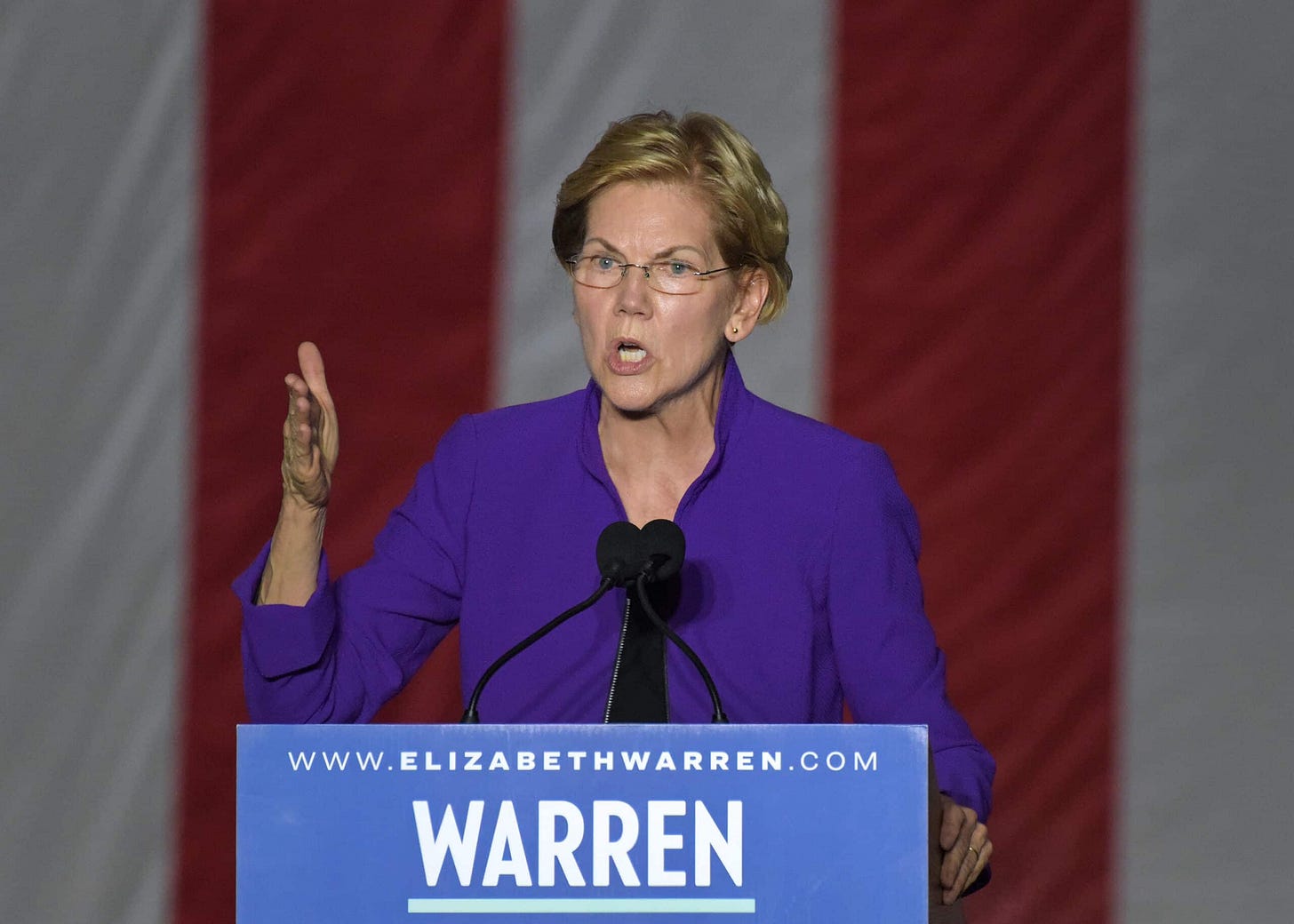Ethereum’s Reign Is Over in This Metric 🧑💻
The Friday episode is about Electric Capital's new developer report with partner Maria Shen. Plus, the weekly news recap.
In this week’s edition:
💼 French Hill to lead key crypto committee.
💰 Microsoft votes down bitcoin treasury proposal.
🇺🇸 Texas proposes bitcoin reserve to boost innovation.
🖥️ Google’s quantum leap sparks fears for Satoshi’s wallets.
🎟️ Magic Eden’s token launch stumbles but drives airdrop frenzy.
⚖️ Warren wields influence over SEC crypto oversight pick.
🌍 Binance and Circle partner to push USDC adoption.
📈 Ripple’s RLUSD stablecoin approved in New York.
🏦 Ethena’s USDe overtakes DAI in stablecoin rankings.
🔒 Coinbase defends fraud measures amid user criticism.
How Solana Beat Out Ethereum to Nab New Crypto Developers in 2024
Electric Capital’s annual crypto developer report details how Solana overtook Ethereum as the top chain for new devs, Asia emerged as the leading region for crypto builders, and more.
The 2024 Developer Report from Electric Capital reveals many shifting dynamics. For starters, for the first time in eight years, Ethereum was not the top chain for new developers—Solana was. Meanwhile, Asia has emerged as the leading hub for crypto development, taking the top spot from North America, which dropped to third.
In this episode, General Partner Maria Shen explores how Ethereum’s Layer 2 solutions are bolstering its position despite fierce competition, why the Bitcoin developer ecosystem remains steadfast, and how emerging projects like EigenLayer are capturing builders’ attention.
She also delves into the top crypto technologies that are fascinating devs, and how their usage and development activity differ across the globe.
Listen to the episode on Apple Podcasts, Spotify, Pods, Fountain, Podcast Addict, Pocket Casts, Amazon Music, or on your favorite podcast platform.
Weekly News Recap
Crypto Advocate Rep. French Hill to Lead House Financial Services Committee
Arkansas Republican Representative French Hill has been appointed chair of the influential House Financial Services Committee, starting in the next congressional session on Jan. 3. The committee is charged with overseeing and developing financial legislation before it heads to a full House or Senate vote and frequently hears testimonies from leading figures in the financial sector including bankers, regulators, and economists. Hill, known for his deep understanding of cryptocurrency and blockchain, has been a key figure in shaping crypto policy as chair of its subcommittee on Digital Assets, Financial Technology, and Inclusion.
Hill has promised to prioritize passing legislation on crypto market structure and stablecoins, aiming to clarify whether cryptocurrencies are classified as securities or commodities and to establish robust collateral requirements for stablecoin issuers. His leadership is expected to strengthen bipartisan efforts on crypto legislation because of his history of bridging divides within Congress.
With the committee overseeing the SEC and CFTC, Hill’s appointment signals a proactive approach to crypto regulation.
Microsoft Shareholders Reject Bitcoin Investment Proposal
Microsoft shareholders have rejected a proposal to allocate company funds to bitcoin, following recommendations from the company’s leadership, with less than 1% of them voting in favor. The initiative, introduced by conservative think tank the National Center for Public Policy Research, suggested using bitcoin as a hedge against inflation, citing its limited supply and historical performance.
Microsoft’s chief financial officer Amy Hood emphasized the firm’s commitment to preserving capital and liquidity to support operations, stating that the company has evaluated cryptocurrencies and continues to monitor the space.
MicroStrategy’s executive chairman, Michael Saylor, who has championed bitcoin investments, argued during the meeting that adopting bitcoin could yield substantial financial gains for Microsoft. Despite his advocacy and the cryptocurrency’s remarkable performance this year, the proposal failed to gain shareholder support.
Texas Proposes Bitcoin Strategic Reserve in New Legislation
Texas State Representative Giovanni Capriglione has introduced a bill to establish a bitcoin strategic reserve for the state. The legislation aims to position Texas as a leader in digital asset innovation while enhancing financial security for its residents.
If passed, the bill would enable Texas to acquire and hold bitcoin in reserve for a minimum of five years, with provisions allowing citizens to contribute donations to the fund. The reserve would serve as a long-term hedge and bolster Texas’s standing in the crypto economy.
The initiative mirrors similar efforts being discussed at the national level, signaling growing interest in integrating bitcoin into government-level financial strategies.
Google’s Willow Quantum Chip Sparks Controversy
Google’s new quantum computing chip, Willow, has ignited debate across the crypto community, raising concerns about the security of older Bitcoin wallets and the broader implications for blockchain encryption. The chip boasts a 105-qubit capability which means it can complete tasks in minutes which would otherwise take millennia, highlighting the vulnerability of outdated wallet formats such as Bitcoin’s Pay-To-Public-Key (P2PK) system.
These older wallets, which include the 1.1 million bitcoins held by Satoshi Nakamoto, could now be at risk of being breached by quantum algorithms. Avalanche founder Emin Gün Sirer proposed freezing Satoshi’s coins to mitigate the threat, suggesting a “sunset date” for P2PK unspent transaction outputs. “As quantum computing gets threatening, the Bitcoin community might want to look into freezing these coins,” Sirer said on X.
While some developers advocate upgrading blockchains to quantum-resistant cryptography, the idea of freezing coins has proven divisive. Critics argue such actions could undermine decentralization, while others see it as necessary to maintain Bitcoin’s integrity as quantum computing advances.
Magic Eden’s ME Token Launch Highlights Airdrop Frenzy
Magic Eden, the leading Solana-based NFT marketplace, launched its ecosystem token, ME, on Tuesday amid significant anticipation, but it wasn’t without challenges. Early trading saw ME’s fully diluted valuation soar to $15 billion before stabilizing at approximately $4.5 billion.
The token airdrop was marred by technical issues, with users reporting problems with accessing the claim process via the Magic Eden wallet app. Errors like “something went wrong” and confusing prompts frustrated participants, some missing the opportunity to capitalize on early price spikes.
Despite these hurdles, over 70,000 users claimed nearly 69 million ME tokens in the first hour, according to Magic Eden. The chaotic rollout highlighted the challenges of large-scale airdrops but also underscored the growing popularity of such initiatives.
Other projects such as Fuel and Movement Network are also leveraging airdrops to engage users. Fuel, an Ethereum rollup, introduced its native FUEL token this week, while Movement Network also launched its mainnet beta and token, utilizing the Move programming language for secure and efficient transactions.
Elizabeth Warren to Influence SEC Commissioner Selection
Massachusetts Senator Elizabeth Warren, known for her critical stance on cryptocurrency, is poised to have significant influence in selecting the next Democratic SEC commissioner. According to party insiders, Senate Minority Leader Chuck Schumer has given Warren a pivotal role in recommending candidates to replace outgoing commissioners Gary Gensler and Jaime Lizárraga.
The SEC can only have three commissioners from the same political party. With one Democratic spot still open, Warren’s input could shape the future of the agency’s approach to crypto regulation.
Schumer’s decision also reflects a political test for Warren. Sources told Unchained that Schumer, who is a moderate, is challenging her to nominate a candidate who can secure confirmation in a Republican-majority Senate. If Warren’s choice fails, it could bolster Schumer’s case for a more centrist approach.
Binance and Circle Forge Alliance to Drive USDC Adoption
Binance, the world’s largest cryptocurrency exchange, and Circle, the issuer of the stablecoin USDC, announced a partnership aimed at expanding USDC's global reach. Revealed at Abu Dhabi Finance Week, the collaboration seeks to enhance USDC’s role across Binance’s ecosystem, including trading, payments, savings, and corporate treasury operations.
“This represents a major shift in the emerging crypto market structure,” said Circle CEO Jeremy Allaire on X.
Binance plans to integrate USDC more extensively into its services, providing its 240 million users with greater access to the stablecoin. Additionally, Binance will adopt USDC as its primary treasury stablecoin.
The development also positions Binance and Circle to navigate the European Union's upcoming MiCA regulatory framework, which may limit the use of less transparent stablecoins such as Tether’s USDT.

Also this week, Circle announced the upcoming launch of the second version of its Cross-Chain Transfer Protocol in early 2025 to enable faster USDC transfers with low-latency settlements across Ethereum, Base, and Avalanche, with plans for broader blockchain integration.
Ripple’s RLUSD Stablecoin Secures New York Approval
Ripple’s RLUSD stablecoin has received final regulatory approval from the New York State Department of Financial Services (NYDFS), paving the way for its official launch. Ripple’s CEO Brad Garlinghouse announced the milestone on social media, stating that exchange and partner listings for RLUSD will be activated soon.
The stablecoin, first unveiled in April, operates on both the XRP Ledger and Ethereum networks. Testing began in August, with Ripple forming partnerships to ensure liquidity and adoption. Notable collaborators include exchanges Uphold, Bitstamp, and Bitso, as well as market makers B2C2 and Keyrock.
Ethena’s USDe Becomes Third-Largest Stablecoin
Ethena Labs’ synthetic stablecoin USDe has surged to become the third-largest stablecoin, with a market capitalization of $5.65 billion, overtaking Maker’s DAI (now known as USDS) at $5.2 billion. The leap follows the addition of its staked version, sUSDe, as a collateral asset on Aave in November, driving significant adoption and liquidity.
Aave’s integration enabled users to leverage the “Aavethena” strategy, which involves depositing sUSDe as collateral then borrowing Tether’s USDT or Circle’s USDC, and recycling funds into more sUSDe. This strategy boosted Aave’s stablecoin borrowing rates to over 20%, said Ethena’s head of growth Seraphim on X.
USDe’s unique model collateralizes with assets such as bitcoin and ether, hedging them through short positions to generate a yield currently at 27%. This yield-centric approach has drawn investors seeking passive income, propelling USDe’s rapid rise in the DeFi ecosystem.
Coinbase Responds to Criticism Over Account Restrictions
Coinbase has addressed user frustrations regarding account restrictions, attributing the issue to a surge in fraudulent activity following the U.S. presidential election. In a statement posted on X, the exchange explained that its fraud prevention systems were working as intended amid a significant increase in new and returning users. Coinbase noted a “2-3x increase in fraudulent attempts,” which led to more restricted accounts and longer customer service wait times.
The exchange dismissed claims of widespread restrictions as misinformation but acknowledged user concerns, stating that it is working to resolve issues quickly. Some users still criticized Coinbase’s response, sharing experiences of prolonged restrictions and inadequate support.








